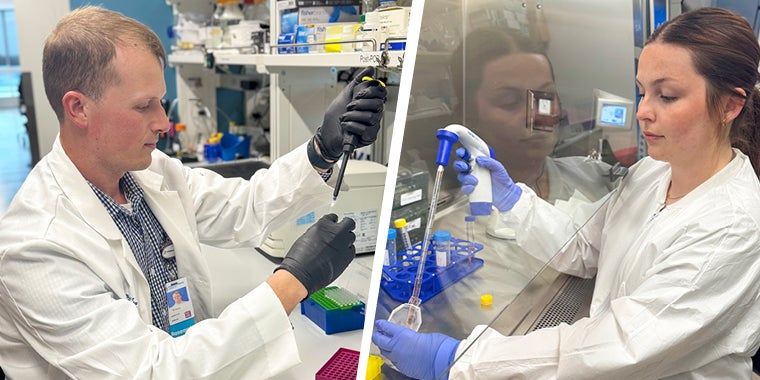Some students enter graduate school with a plan. Others come looking for direction. At Kansas City University’s (KCU) College of Biosciences, both kinds of students find space to grow and the mentorship to figure out what comes next.
For Katelyn VanDonge, that meant using KCU’s Master’s in Biomedical Sciences one-year track as a bridge between undergrad and her dream of medical school. For Bradley Thornton, it meant taking time in the two-year research track to build lab skills, figure out his interests and explore career options outside the classroom.
Now, both alumni are working in biomedical research at the Children’s Mercy Research Institute. And both credit KCU with helping them get there.
Finding footing on the fast-track
When VanDonge graduated with her undergraduate degree, she knew she wanted to keep moving forward but wasn’t sure exactly how. A former supervisor suggested KCU’s biomedical sciences program.
“Instead of taking a gap year, I wanted to strengthen my experience before moving on to medical school,” she says. “KCU gave me a way to move forward.”
She graduated from KCU in 2024 and currently works as a lab technician studying parechovirus in infants. Just three months into the role, she was co–first author on a research manuscript.
“The only reason I caught on so fast was because I already knew the fundamentals of cell culture,” VanDonge said. “I thought research would be repetitive, but it’s not. Every week we’re doing something different.”
She is enjoying her work and plans to prepare for the MCAT and apply to medical school when the time feels right.
Slowing down to speed up
Thornton graduated in 2022 from the two-year research track and now is a research specialist studying Vici Syndrome, an ultra-rare congenital disorder caused by a specific mutation.
“The two-year track gave me space to slow down and ask: what do I actually enjoy?” he says. “I learned I like the problem-solving side of research. That wasn’t obvious to me before.”
Thornton also appreciated how the program created opportunities to connect with mentors, present at conferences and gain practical skills, not just in the lab, but in writing, communication and time management.
“I fell in love with research because I could still do the things I enjoyed and be part of moving medicine forward without the stress of being a doctor,” he said.
How mentorship and momentum shape the KCU experience
Both VanDonge and Thornton point to faculty in the College of Biosciences who helped them navigate their next steps.
That individual attention stood out, especially in a program with mor than100 students.
Fast-paced and demanding, the one- and two-year master’s programs in Biomedical Sciences are designed for students who want to stay close to science, build practical skills and explore options beyond the traditional pre-med path.
“It was the hardest year of my life,” VanDonge says. “But it taught me how to learn fast, how to study and how to keep going.”
“You leave with more direction,” Thornton adds. “That’s what I needed and what a lot of people are looking for at this stage.”
To explore careers in biomedical sciences, click here.




(0) Comments